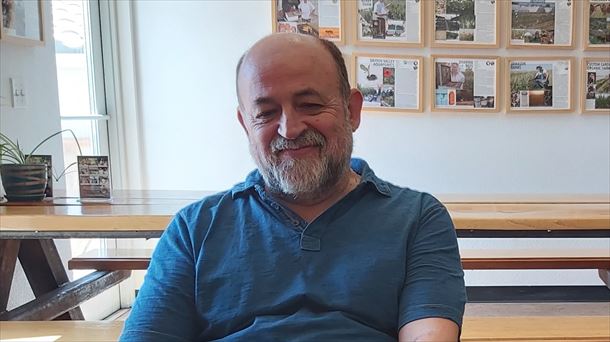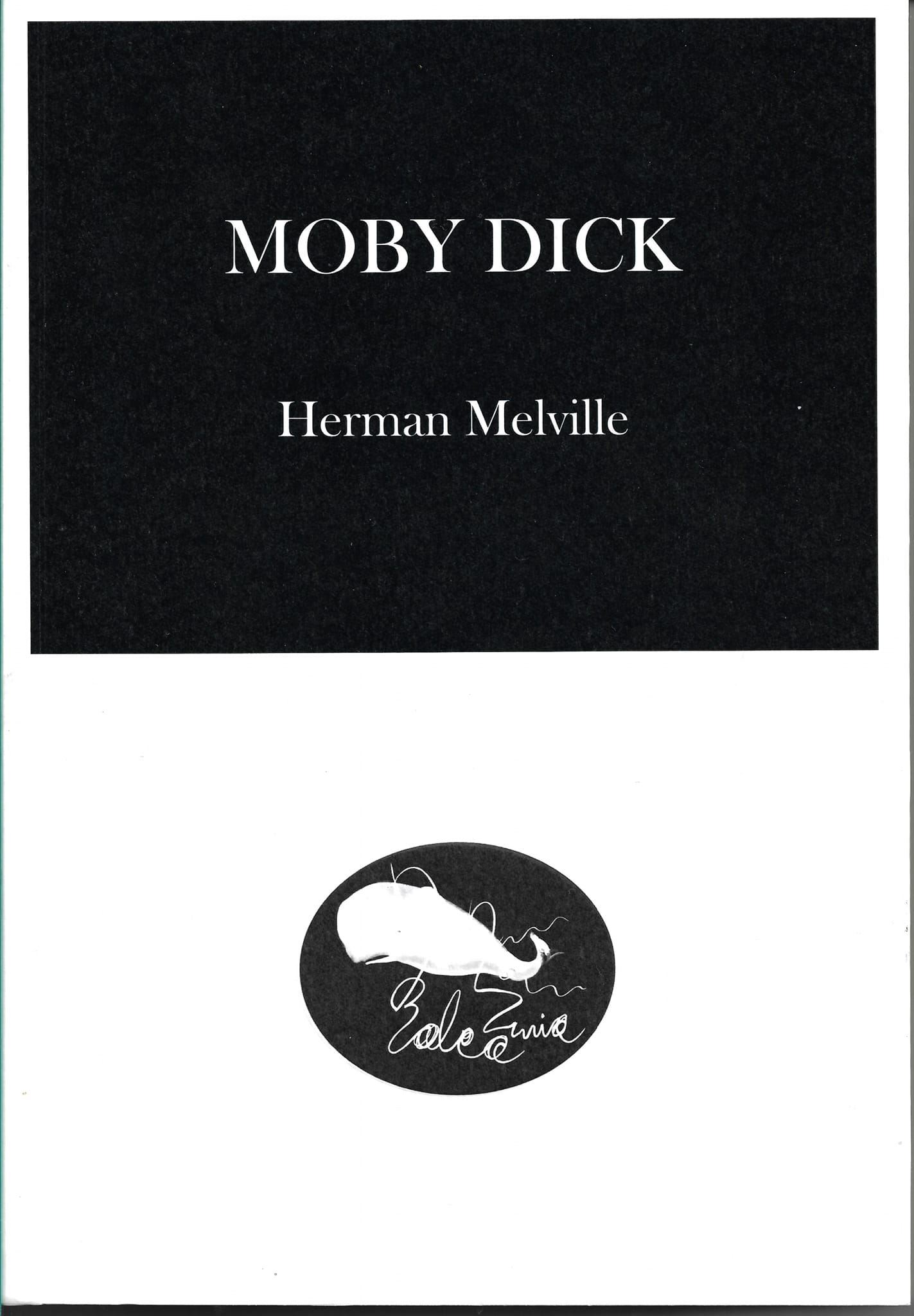Juan Garzia: “To translate, you have to be both the proudest and most humble person in the world”
Euskaraz irakurri: Juan Garzia: “Itzultzeko, munduko pertsonarik harroena eta umilena izan beharra dago aldi berean”
“A stubborn and disastrous chase after a large white sperm whale”: the translator Juan Garzia Garmendia (Legazpi, 1955) summarizes the theme of the 577 dense pages of the novel Moby Dick in those ten words, within the invaluable, profuse and illustrative prologue collected in the Basque version (Balea Zuria publishing house, of course, 2023) of the classic published by Herman Melville in 1851.
But beyond that, it is well known that, starting from that apparently simple argument, the voyage of the whaler pequod has illuminated endless interpretations around the persistent search for Moby Dick by Captain Ahab and the rest of the crew, as befits valuable artistic works.
It has been said about Moby Dickamong many other things, that it is “the best novel in North American history” (Enrique Lago), that there is no reader “capable of fully capturing Melville’s vision of the world” (Anjel Lertxundi), that it is impossible task “to try to capture the richness of its resources and effects to the last element” (Cesare Pavese), which is “an infinite novel” (Jorge Luis Borges and Edorta Jimenez) and even, as a sample of the depth of the paths that opens, which is “the story of a crazy entrepreneur in an extractive exploitation project that drags a team of precarious workers” (César Rendueles).
Fortunately, the time has finally come for readers in Basque to complete their Moby Dick, thanks to the captivating and accurate result of Juan Garzia’s work in translating the novel. Let’s hope the reader doesn’t shy away from the arduous but rewarding reading experience with that “I’d rather not” argument. Bartleby, the clerk, a novel also created by Melville and also translated into Basque by Garzia. He would regret it.
We have spoken with Garzia.
Have you read before Moby Dick? How have successive readings and the translation work changed your point of view and your relationship with the book?
I had read a few fragments here and there, in English and Spanish. On the other hand, my debut in literary translation into Basque was with another Melville masterpiece: Bartleby. These are two books with very different writing; Moby Dick It is much more sophisticated.
On a first reading, the focus is on the thread of the narrative. On the contrary, when translating it, you stumble word by word over many details, and the excellence at all levels of a book full of symbolism stands out more clearly, in which the style converges with great coherence with the theme and the setting. with the characters and the story.

Juan Garzia Garmendia. Photograph provided by the translator.
How long did the translation take you? What have been the greatest sufferings and joys in this work?
It has taken about five years to finish the first version of the translation. That phase is a joy for addicts like me.
It is later that penance comes, with the correction process. Review and recompose, and review the improvements again in a process, of course, infinite. Until you reach a point where you have to give up, with great haste, in the face of the danger of starting to smear the text instead of improving it.
“Call me Ishmael.” Melville’s novel begins with this mythical phrase, which has become one of the best-known beginnings of universal literature. How many times have you thought about the beginning, given that there is more than one interpretation of the phrase, and why, finally, “Esadazue Ismael”?
I have already stated in some other forum that it did not seem to me that the little phrase presents a special technical complication to be translated. It’s more about how the reader interprets it (is it a real name? Who is that voice addressed to?…).
In the Spanish versions there is a big mess around it; in Basque, only two issues: on the one hand, identifying as singular or plural the recipient of the phrase (“deitu ni(ri) Ismael” would be its corresponding more literal, but it doesn’t seem like the most natural way to say it). The other decision is more personal: use the verb esan (in this phrase and in the rest of the text) to avoid the dialectal issue that the verb opens deitu between neither either niri.

‘Moby Dick’
What material did you use to translate? Moby Dick? How much does the bibliography help in this work and when and why are translations into other languages used?
In fact, the advantage of these global works of art is that they have already been the subject of colossal analyzes from different points of view, both in terms of quantity and depth. And at a more common level, there are sources to clarify the lexical details and cultural references of the text.
Plus, today we have a lot of that information just a click away. The versions in other languages offer you another type of assistance, such as the possibility of using them as a stimulus for the imagination in a specific passage (but without slipping into them completely).
On some occasions, I have resorted to translation into French, and more frequently a couple of translations into Spanish (to date, 18 have been published Moby Dick different in Spanish!).
Shakespeare resonates in Moby Dick, as many analysts have stressed, and you also mention in the prologue that Melville immersed himself deeply in reading Shakespeare. From the perspective that having also worked on Shakespeare’s work offers you, what lines unite Melville with Shakespeare?
We know that Melville read Shakespeare’s work for two years before undertaking the writing of Moby Dick. It seems that this helped him shape the work material on whales that he had accumulated, it helped him use it as raw material in the construction of the story.
Formally, there are some passages presented in an eminently theatrical format; but I believe that Shakespeare’s main feature is manifested in the construction of the characters and, above all, in the figure of Captain Ahab (heroic in his fatality).
And, of course, in the main theme of the novel, Ahab’s monomania, there is also a Shakespearean aftertaste: kill (to the whale) or die (I), That is the question.
What do you think gives another dimension to this book? What do you think is the reason for its status as a classic and the category, for many, of the great American novel?
Phew! Enormous complete books have been written on these two questions.
On the one hand, the book is written and set in the era in which the United States was on its way to being the greatest world power, and it is easy to identify the voyage of the whalers as a reflection or symbol of the society that was emerging. , of its industrial strength and the social structure on which it was based: a ragged working class coming from all over the world and made up of people of all races, under a rigid hierarchy (and a complete madman blindly driving that alienated mass: the situation sounds familiar, right?).
The dimension of classic, for its part, (the US being, in a certain way, a reflection of the entire world) has been granted to it by readers from all over the world, despite the fact that, as is known, its success did not It was immediate.

Juan Garzia Garmendia. Photograph provided by the translator.
What does the translator have to do to go unnoticed in the text? What should you do and what should you avoid, so as not to transform the valuable material with which you work?
On the one hand, being the proudest person in the world: I’m going to be Melville in Basque. And on the other, the most humble: I work entirely at the service of the text.
It is as easy to say as it is difficult to do, but I have said before that some of us find life in the vice of literature (and Basque).
For whom is the Basque version of Moby Dick?
For people passionate about reading literature in Basque.
What would you say to someone who is about to embark on the adventure of reading? Moby Dick?
May the winds be favorable to you!
Are you working on a new translation? What debts to universal literature most press Basque today, from your point of view?
Adapting Axular’s famous quote: it is not the literature translated into Basque that is to blame, but rather the limited Basque reader. I think that at this point it is more urgent to strengthen reading than to expand the offer.
Anyway, in case you wanted a short list, perhaps it would be better if you asked me what No I want to see it translated into Basque… I myself have begun the corrections of a copy that will complete my series of Shakespeare translations. But that is another story.
Source: Eitb
Bruce is a talented author and journalist with a passion for entertainment . He currently works as a writer at the 247 News Agency, where he has established himself as a respected voice in the industry.












